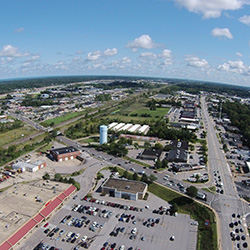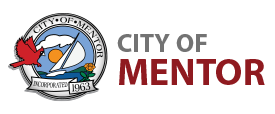by Brandon Baker
 After three decades on the job, Ronald M. Traub’s enthusiasm for Mentor has not waned. Not even a tiny bit.
After three decades on the job, Ronald M. Traub’s enthusiasm for Mentor has not waned. Not even a tiny bit.
Sitting under office shelving adorned with dozens of coffee mugs and collectibles commemorating various years and events, the city’s director of economic and community development continuously beams when discussing Mentor’s present and future prospects for growth.
One moment he might turn to one of his tried-and-true takes on Mentor’s retail market, which ranks sixth in Ohio behind only Cleveland, Columbus, Cincinnati, Toledo and Akron: “If you can’t buy it in Mentor, it’s probably not worth having.”
Then, Traub might discuss forthcoming projects like the Liberty Business Park, a subdivision behind the old Caterpillar plant off Tyler Boulevard that could provide access to 72 to-be-developed acres that are already zoned for manufacturing use if nearby Justin Way is extended.
His excitement may have peaked when discussing De Nora Tech’s plans to build a 100,000-plus square-foot building on Tin Man Road, near the Tyler-Heisley Road intersection. An unannounced company has purchased the adjoining site to construct its 100,000 square-foot facility after several months of negotiations, Traub said.
“We haven’t seen that type of activity in well over a decade,” Traub said. “Mentor is hot, hot, hot.”
Taking most measurements, data and anecdotes into account, it’s hard to disagree with Traub. In addition to the more than $1.5 billion in annual sales that gives Mentor the aforementioned retail ranking in the state, it’s also first per capita in Ohio with 170 places to eat. With 300 manufacturers, the city ranks as the seventh-largest base of creators in Ohio. Having nearly 265,000 consumers within a 10-mile radius certainly aids those figures.
All told, there about 1,700 business in the city with 3.3 million square feet of retail development and 3,200 acres zoned for manufacturing. The city’s 4.2 percent industrial vacancy rate lends credence to Traub’s “hot” claim.
“Heisley Road, I think the only thing that used to be over there was the Heisley Racquet Club,” Brian Parent, director of operations at ACO Polymer Products, said while remembering his childhood as a Lake Catholic High School student who would be bused in from Kirtland in the ‘80s.
“Now, you have so many businesses over there,” Parent continued. “We’re continuing to grow, and we want to build as Mentor builds.”
The Right Fit
ACO Polymer hosted a grand opening for a new Mentor facility in fall 2015 after purchasing an existing building on Pinecone Drive the prior year. That opening meant a move from Chardon, where the global company’s first U.S. manufacturing facility had existed since 1978.
Now, ACO uses its Mentor building to execute sales in the front and manufacturing and distribution of its polymer concrete drainage systems in the back. Parent says the company basically gutted the former 3M Co. site, adding concrete in the yard, new docks, and more.
A key to the move was the fact that ACO would be able to use about nine of the 10 acres on the lot. Parent says the company had been restricted to using just half of the five acres to comply with Geauga County’s mandate that half of the land be preserved for green space. That proved to be a big problem for a growing manufacturer.
The relocation meant new vendors and access to bigger pool of candidates for its workforce. Parent said ACO picked up four or five vendors just by moving to Mentor. Additionally, employee candidates from other communities in Lake and Cuyahoga counties showed interest because their new location was much closer to Route 2 and Interstate 90. There are 55 workers at the building on Pinecone.
“Some people from Cuyahoga County and Lake County still feel like [Chardon] is way out there,” he said. “It’s really not, but that’s how they felt. Driving out into the snowbelt was an issue.”
Truckers and suppliers had some of the same feelings.
“We are closer to a lot of the trucking, and they want to get in and out of town a lot faster,” Parent said. “They didn’t want to stay until 5 or 6 p.m. out in Geauga County, they wanted to be closer to Cleveland around those times.”
ACO spent the early part of its two-year relocation process considering locations in Mentor, Painesville and Concord. Receiving business and income tax incentives from the city to help employees whose taxes would increase helped seal the deal.
“The way they’ve laid out their industrial parks, how they continue to look for growth … you look at the communities closer to Cleveland and you don’t see that,” Parent said.
Economic Toolbox
After a decade of participation in Lake County’s tax abatement program between 1990 and 2000, city officials developed two economic tools in hopes of continuing to build the robust industrial hub that exists today: The Mentor Incentive and the Mentor Economic Development grants.
For the former, a company can invest in new machinery, a new or extended lease or funds that would increase their payroll, which adds to the city’s income tax receipts. In return, the city would provide a multi-year grant based on a company’s performance in adding jobs or payroll. Applying businesses can receive up to 50 percent of the value of income taxes those moves paid to the City for up to a decade.
The Mentor Economic Development Grant is a one-time grant aimed at helping firms expand or move even if they don’t qualify for the incentive grant. The maximum for the grant is $10,000 and also based on a company’s payroll taxes and investments. Polychem Corp.’s plan to move a firm it acquired from Michigan to Mentor in 2016 serves as an example.
“We wanted to offer incentives to smaller companies that maybe didn’t have larger payrolls, but nevertheless we wanted to encourage their growth in the community,” Traub said. “While manufacturing has declined in the nation and state, the decline in Mentor has been less and not as precipitously. I like to think it’s because of the investment made in the community. While some like to say manufacturing is dead or dying, we’ve certainly seen an evolution in the city, in terms of the goods and products that are produced.”
Other available tools include the Micro-loan Program, access to Small Business Administration 504 financing and the Mentor Economic Assistance Corporation [MEACO], the nonprofit that has been helping businesses in the city since 1983.
Fredon Corp. received a $10,000 grant when it settled into a new headquarters nearly five years ago on Tyler Boulevard. CEO Roger Sustar remains thankful for that grant, considering the move from Enterprise Drive cost at least $100,000.
“They’ve always been very nice to us,” Sustar said of city leadership. “We still have to pay the taxes like everybody else, but what I always tell people that when you’re in Lake County or Mentor and as small as we are, company-wise, we’re still a fish that people like to play with. If we were in Cleveland or Cuyahoga County, there’s zillions of little companies like us. You get lost in the shuffle.
“The nice thing is to always be considered part of the community, and Mentor’s always been kind on that.”
Fredon moved to Mentor from Euclid in 1981 on the recommendation of John Macso, a successful banker and Mentorite who died in 2006. Over the years, Sustar remained impressed at the little things, like the city’s fire department filling up the company’s pond, to bigger matters, such as its perseverance and remaining a partner during national crises like the terrorist attacks of September 11, 2001 or the Great Recession of 2008.
“Most of the [bigger companies Fredon did business with] had gone from paying their bills quickly, to 45 days, 60 days, 75 days to 90 days. That’s what transpired in those years,” Sustar recalled.
Traub believes the city’s diversified base of businesses helped it maintain during those times that stressed much of the country well beyond financial considerations. It’s Sustar’s belief that those periods, combined with the previously devastating strikes, closing and exodus of about 2,700 jobs at Caterpillar in 1985, helped Mentor even further understand the value of small businesses.
“For a city that’s lost all those thousands of jobs that Caterpillar was there for, W.S. Tyler and all those guys, they managed,” Sustar said. “I think that’s why they support smaller companies who are doing things like we’ve done over the years because they’ve seen what some of the big companies do when they pick up and leave.”
Always Moving Forward
“The founding fathers of the city developed our zoning in a way that worked out very well for us,” says Ray Kirchner, Councilman-at-Large, “The nurseries were zoned commercial so it was a natural transition to commercial development”.
The city’s goal is simple: Go after jobs. Bring them in. Retain them.
The Caterpillar plant closing in the mid-80s could have had a devastating effect on the community were it not for the Mentor’s already growing diverse business mix.
“Although the facility has never truly recovered, we recovered because we didn’t sit back and bemoan the fact that they were gone. We went out and worked with developers to create jobs”, says Kirchner.
“The sum total of what Mentor has to offer has made it noteworthy in the business community. Our economic development team got stronger over time,” adds Kirchner, “Today it’s no so terribly difficult to bring a business to the city.”
The city is committed to investing their resources in order to promote growth well into the future. With the uncertainty of the retail market, alternatives are being discussed.
“The items we’re working on now will have an impact on the community for decades in the future,” says Kirchner.
All About the People
If you ask Mark Small why Cleveland Construction never picked up and left Mentor, he’s likely to give you a two-word answer. In fact, he might use that same phrase to answer several questions about the value of doing business in his hometown or the highlight of that location.
“The people,” the company’s principal and chief financial officer said several times in several different tones via phone in Florida.
While Cleveland Construction has expanded into Columbus, Cincinnati, Charlotte, Jessup, Maryland and Naples and Fort Lauderdale in Florida, Mentor was always going to be home base. That’s not because other cities and states failed to try, either.
“We’ve been courted by a number of other communities to relocate, but there’s a couple of things that always come to mind when we start that process. There might be some economic reasons to think about moving, but there’s these core values,” Small said.
The chief value is a dedication to his employee base, which includes some Mentor residents and Northeast Ohioans who have been with Cleveland Construction since 1980 when the family firm started operations.
“You couldn’t find a better group of core people as a workforce to pull from,” he said. “They’re solid, they’re family-driven and they’re faith-based. They’re generationally deep in the community, and they’re also involved in social things in the community, whether through private ventures or on the boards of hospitals.”
Small is particularly passionate about the generational portion of that statement.
“People aren’t from Naples. People aren’t from Fort Lauderdale. Their grandparents aren’t buried there,” Small said. “We have that in Cleveland.
“My great-grandparents are buried there, my grandparents are buried there. My father is buried there. I’ll be buried there. When you have generationally deep roots, it keeps people stable and focused. You just don’t find that in transient communities.”
Some of Cleveland Construction’s people didn’t want to stick around Northeast Ohio, which wasn’t an issue for Small and family. Each person who runs one of the company’s seven locations is from Mentor or Greater Cleveland.
“The roots everywhere come back to Northeast Ohio,” Small said. “It doesn’t matter how much you pay, you can’t buy loyalty or work ethics. You either have them or you fail.
“You can’t buy honor, you can’t buy integrity.”
Cleveland Construction has about 2,000 employees between all of its locations, including 300 in Mentor. Like Sustar, Small had fond memories of receiving help from the city in 1983 when Cleveland Construction built its facility on Tyler Boulevard.
“The [MEACO] program helped us fund that,” Small said. “It’s tough to start a startup company. The rules and regulations are horrendously difficult to navigate through … you can screw up without even trying. Most fail in the first three years, and it’s not a surprise why.
“It isn’t just the ability to perform whatever you’re trying to do, it’s the whole picture of running a business. The city helps you through some of that.”
Going Global
Mercedes Sanchez-Moore, Ph.D. has only been working for the City of Mentor for a year, but she’s already thinking big — as in, global big.
In late April 2017, the city’s international trade manager had planned a three-pronged European trip for herself, other city representatives and a Mentor company. First, she planned to bring the company to Germany to meet with a potential partner company Sanchez-Moore had found so they could trade intellectual property and possibly begin manufacturing for one another in each market. She also planned to make presentations to businesses in Berlin that are considering expanding into the United States.
Next, Sanchez-Moore and the others would attend Hannover Messe, the world’s largest trade show for machinery, automation and manufacturing. It would be the city’s third time partnering with a delegation from the City of Akron, Jobs Ohio and Team NEO and visiting the trade show as part of the Northeast Ohio Initiative, she said.
Finally, Sanchez-Moore said the group would visit London and Birmingham to meet with representatives from Solihull, which has been discussed in recent years as a potential sister city to Mentor.
The jaunt is the latest piece of the city’s International Trade Initiative, an aggressive push announced by Mentor City Manager Ken Filipiak in 2013 to help companies here expand their businesses, find foreign investments and more.
“I’m actually looking forward to having more initiatives to help [Mentor businesses] do more things and better things,” Sanchez-Moore said. “My intention is to have a manufacturing conference after we come back from Germany to help companies with international and domestic marketing, as well as compliance. We want to spread the word in regards to the assistance they could have for their expansions and financing.”
As it stands, 80 percent of the products made here end up in exported goods, she said. Direct exports account for more than 20 percent of Mentor manufacturers’ business.
To that end, Sanchez-Moore lauded STERIS, US Endoscopy, MSD Products, Lincoln Electric, Avery Dennison, Component Repair Technologies, Wiseco, Air Power Dynamics, W.S. Tyler, EYE Lighting International, Volk Optical, Process Technology, and Parker Hannifin as major players in the Mentor exports game.
Sanchez-Moore meets with a couple companies per week as part of her quest to meet with the city’s top 100 businesses, but she can’t and won’t limit herself to that group.
That’s because she wants to make companies aware of resources like the Ohio International Market Access Grant for Exporters (IMAGE) supported by the SBA, through State Trade Expansion Program (STEP). In September 2016, the SBA awarded $750,000 to the State for the grants that are designed to increase exports and create jobs. Each grant provides a 50 percent reimbursement up to $10,000 per fiscal year (5).
Sanchez-Moore has already helped three businesses secure these grants, though she can’t disclose who they are just yet. That money will help cover the cost for international marketing, including translations of websites, travel, services from the Department of Commerce, to find distributors overseas and more.
She’d also like to start a structured compliance program to help companies create their export and import compliance manuals.
“When I work with a company, I try to help them in whichever area I can, not just one,” she said. “I try to help them understand where they are and try to improve their operations, marketing, sales bringing other resources I’m aware of.”
That line of thinking is no different than Traub’s discussion beneath his coffee mug shelves. He drove this point home by mentioning the rare instance when he hadn’t found out about a Mentor company until it received media attention. He didn’t know anything about Royal Decorating and Construction Co. or its co-owner, Saideh Yousefi, but a Cleveland.com article determined him to learn more.
Similarly, he has begun monitoring the state’s monthly listing of newly incorporated businesses. About three years ago, he and his department began sending out letters based on the list, offering information on various requirements and a helping hand as they adjusted to operating in Mentor.
“I don’t know of anybody else who’s doing that,” Traub said. “It’s an opportunity to get in with somebody on the ground floor and trying to help them.
“I try not to ignore any size business. If somebody comes in as an entrepreneur, I’m interested in working with them.”

 Brandon Baker is a freelance journalist, nonprofit resource development professional and Mentor resident. His work has also been featured by Scene, The News-Herald and more. He sits on several boards around Northeast Ohio. Brandon is a graduate of The Ohio State University and enjoys traveling, exercising and spending time with his family.
Brandon Baker is a freelance journalist, nonprofit resource development professional and Mentor resident. His work has also been featured by Scene, The News-Herald and more. He sits on several boards around Northeast Ohio. Brandon is a graduate of The Ohio State University and enjoys traveling, exercising and spending time with his family.